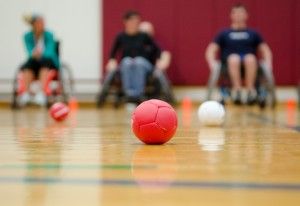Equality on the court
February 13, 2013
Out of eight people playing wheelchair basketball Tuesday night at the Student Recreation Center, only one actually needed the wheelchair.
Mike Day, who uses a motorized wheelchair, started playing wheelchair basketball when he was an undergraduate to meet other people. The 2005 sports management alumnus said it is important to play the sport with able-bodied individuals.
Advertisement
“It shows people that we can do whatever everybody else can,” Day said. “We just do it a little bit differently or a little bit slower.”
Wheelchair basketball is a sport offered to disabled students and community members through the Adaptive and Inclusive Recreation program this semester. Although the sport is intended for those who use a wheelchair, anyone can play.
Kat Hamilton, graduate assistant for adaptive and inclusive recreation, says it is important to have collaboration between individuals with and without disabilities.
Sam Gooding, the director of SIU’s Disability Support Services, said the university is one of the best when it comes to adapting and including students with disabilities. However, a 2010 report by the U.S. Government Accountability Office found that many students in the country are not given the same opportunity in sports as their able-bodied peers.
Because of the findings, the U.S. Department of Education’s Office for Civil Rights issued a letter to school districts Jan. 25 to clarify the necessity of equal opportunities in sports and give examples of how to modify athletics for persons with disabilities. Under section 504 of the Rehabilitation Act of 1973, students with intellectual, developmental, physical or any other disability have the right to extracurricular activities or be provided equal alternative options.
People like Day will always be guaranteed an equal opportunity in sports at public education institutions because of the directive.
While the examples, such as waiving the “two-hand touch” in swim meets so a one-armed person could compete, are directed at primary and secondary educational facilities, the letter states students with disabilities at postsecondary schools must also be given opportunities to participate in athletics.
Advertisement*
Arne Duncan, U.S. secretary of education, said in a statement when the guidance was announced that equal opportunity ensures students with disabilities can benefit from the life lessons sports provides.
Hamilton, a graduate student in therapeutic recreation from Libertyville, said sports are more than competition; they are a social experience.
“(Sports) gives them that college experience just like anyone else would have,” she said. “Able-bodied students can go do (intramural) sports with no issues. They can just sign up and not have to worry about obstacles. So offering theses sports gives them that same opportunity.”
Goodin said the Office of Disability Support Services mostly makes sure the campus is accessible for people with disabilities and does not do much when it comes to helping students outside of academics.
“Basically, if you have a disability and you come here you really want to be doing all the things other people are doing. You don’t want to be hanging out with people that have disabilities,” he said. “We are very much about integrating students with a disability into the same experience everybody else is having.”
Hamilton said while adapted sports such as basketball, Boccia — the Paralympic version of Bocce — swimming and bowling with devices such as ramps are important, the recreation center also offers adapted fitness to stay healthy.
The fitness program is free to students and individuals with a Recreation Center membership. A partner helps the person develop a workout program and assists them in the weightroom.
“It’s very difficult for somebody that has a spinal cord injury, for example, to get cardiovascular exercise. But it is incredibly important,” Goodin said.
Advertisement









